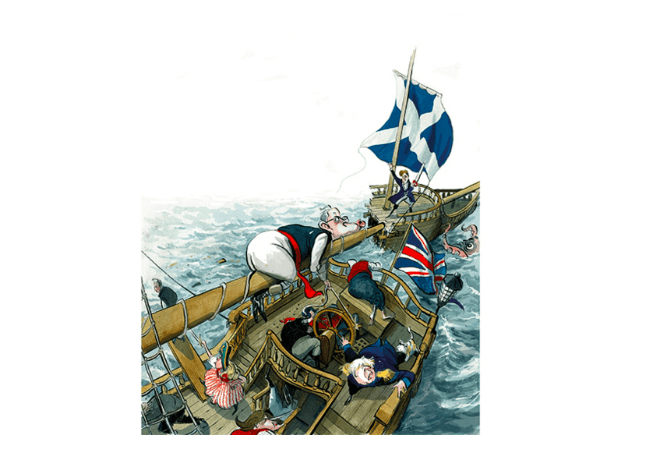Bad news for unionists in Westminster. A new Opinium poll on the Scottish parliament elections projects that the SNP are on course for a majority come 6 May. The party is polling at 53 per cent (44 per cent on the list vote) and on this would get a majority of around 13 seats. Meanwhile, the Conservatives are on 21 per cent and Labour on 18 per cent.
The poll makes for disappointing reading for government ministers who had begun to hope that their Scotland problem might disappear of its own accord. After Nicola Sturgeon came under fire in the Salmond inquiry, support for the SNP fell, while several polls suggested support for independence was on the decline.
When counts as a responsible time for a referendum? Two years? Five years? These are questions Boris Johnson will be under pressure to answer
This meant the Conservative party began to hope that the threat of independence could be on the retreat. Recent attendees to union meetings in government left with the impression that Michael Gove – who is leading union strategy from the Cabinet Office – believed that Sturgeon’s problems could deprive the party of a majority. Were that to happen, Sturgeon would find it hard to push for a second independence referendum – as she intends to do.
However, it seems a combination of James Hamilton QC’s independent inquiry clearing Sturgeon of breaching the ministerial code and the resilience of the SNP brand mean that any hopes for a party in freefall are misplaced. As James Kanagasooriam explains here, the arrival of Alex Salmond’s Alba party could even boost the nationalist cause when it comes to a super majority for independence.
Of course with several weeks to go, much could change. But were the poll to come to fruition, it leaves Boris Johnson’s government with a headache. As I reported in The Spectator, there has been a shift in strategy in No. 10 when it comes to the union.
After losing not one but two heads of the union unit in recent weeks, the Prime Minister has moved from a scorched earth approach to the Scottish government (as advocated by former union unit head Oliver Lewis) to Gove’s preferred strategy of love-bombing Scots. This has so far seen a shift in how Johnson talks about a referendum, moving from a ‘once-in-a-generation’ vote to avoiding an ‘irresponsible’ referendum. The phrase had initially been ‘reckless’ but it did not fare well in focus groups.
By talking about an ‘irresponsible’ referendum, the government has moved away from the Lewis strategy of not opening the door to any referendum. Instead, it’s a question about when, not if. This is in part because there is a view in government that by saying no full stop you make it ‘safe’ for voters who don’t want independence to back the SNP. That thinking helps to explain this tweet from the Scottish Conservatives suggesting a referendum is coming if the SNP triumph:
If the SNP does succeed in winning a majority, it’s an approach that creates immediate problems for the government. When counts as a responsible time for a referendum? Two years? Five years? These are questions Boris Johnson will be under pressure to answer.
The other aspects of Operation Love Bomb – as described by MPs – include strengthening emotional attachments to the UK, UK-wide projects and engaging in questions of independence. But these are all long-term projects, and should Sturgeon come out on top in May, Johnson will be under pressure to offer immediate answers.







Comments